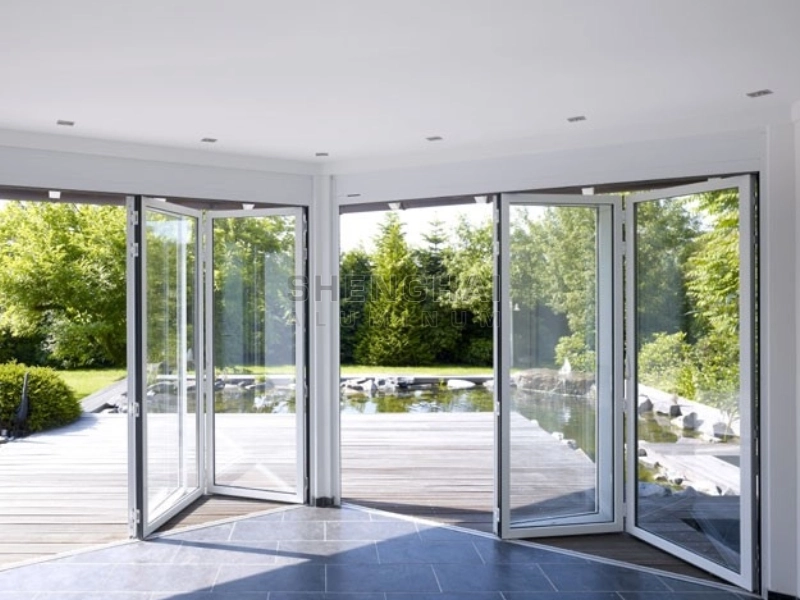What Is Aluminum Glass Door Profile
Aluminum glass door profile is an aluminum frame profile that fixes the glass door panel to the door frame and is the main material supporting the glass door. It is formed by extrusion process and is widely used to make door frames, such as folding aluminum glass doors, sliding aluminum glass doors, flat doors, etc., due to its unique advantages. Their frames are all made of aluminum alloy glass door profiles, which have the advantages of durability, light weight, corrosion resistance, pressure resistance and environmental friendliness. Next, Shenghai Aluminum will introduce its advantages and how to choose the best quality aluminum glass door profile.

Advantages Of Aluminum Glass Door Profile
Durability
Compared with wooden and PVC door frame materials, aluminum alloy glass door profiles have strong durability, which is attributed to their composition, surface treatment, etc. They can be used for a long time in some harsh environments, such as bathrooms, kitchens, and balconies. Because aluminum glass door profiles have the advantages of moisture-proof, oil-proof and sun-proof, they can maintain their shape and avoid corrosion for many years, and can be used to make bathroom glass doors, kitchen glass doors and balcony glass doors.
Lightweight
Aluminum profiles have the advantage of being lightweight, which can save transportation costs, installation costs, and installation time, and improve efficiency. After installation, it can also reduce the load pressure on walls, glass, and door tracks. For example, the impact on folding doors and sliding doors is also significant. Lighter aluminum doors exert less pressure on the track wheels, which is conducive to the smooth sliding of the door on the track.
High strength
Although aluminium alloy profiles are light, they have strong compressive and tensile capabilities. Some aluminium alloys even have strength comparable to that of steel. Aluminium glass door profiles are not pure aluminium; they undergo alloying treatment, with elements that enhance strength added to the aluminium material, such as magnesium, silicon, copper, and zinc. 6063 aluminium alloy is the most commonly used aluminium glass door profile grade. Its core elements are aluminium, magnesium, and silicon. It is precisely because of these three elements that 6063 is so sturdy.
Corrosion resistant
The corrosion resistance of aluminum profiles is mainly due to the influence of anodizing and surface treatment. Compared with stainless steel, aluminum profiles have stronger corrosion resistance because they can form a dense oxide film that does not react with moist air or water. Compared with wooden doors, the corrosion resistance of aluminum alloy glass door profiles is more obvious. Wooden door materials are prone to corrosion when exposed to water, especially untreated wood. Moreover, wooden door materials are easily decomposed by fungi and bacteria in the environment and are subject to being eaten by termites, which accelerates the reduction of the door’s lifespan. However, such situations do not occur with aluminum materials.

How To Choose Best Aluminum Glass Door Profile
Although aluminum profiles have many advantages, there are differences in quality. How should we choose good aluminum and glass door profiles? Consider the following factors.
Profile types
Profile types can be classified according to the door opening method into common door profile types such as swing door aluminum profiles, sliding door aluminum profiles, folding door aluminum profiles, etc. Each door type has different profiles, such as their cross-sectional heights and cross-sectional types. The commonly used cross-sectional height range can be referred to as 40-100mm. The thickness should not be too thin or too thick. If it is too thin, the door strength will be insufficient. If it is too thick, the door weight will be too heavy, affecting the door’s lifespan and increasing the price. Common cross-sectional types include T-shaped, L-shaped, U-shaped, and H-shaped. Among them, the T-shaped cross-sectional type is the most popular.
Aluminum profile wall thickness
The wall thickness of aluminum door profiles is measured in millimeters. At Shenghai Aluminum, we offer three thickness options for aluminum profiles: thin wall (less than 1.2mm), standard (1.2-2mm), and thick wall (greater than 2mm). The most commonly customized type by our customers is the standard wall thickness aluminum profile, which strikes a balance between strength and price. It is suitable for both household and commercial use, ensuring adequate strength while offering good value for money.
Quality
The quality of aluminum alloy glass door profiles depends on the composition and purity of the raw materials, production process, surface treatment, dimensional accuracy, and appearance.
1.Raw material composition and purity
The higher the aluminum content in the raw materials, the higher the quality. The composition of the alloy can also affect the quality. For example, the 6063 series aluminum door profiles mainly contain the elements Al, Mg, and Si. If other metal impurities are mixed in, the quality will decline. Therefore, when choosing aluminum profiles, it is important to check the aluminum purity and alloy elements carefully.
2.Production process
The production process also has a significant impact on aluminum profiles. For instance, the extrusion process involves controlling various variables such as temperature and extrusion speed. The temperature should not be too high or too low, as it will ultimately affect the appearance and strength of the aluminum profile. The extrusion speed needs to be controlled; otherwise, it may cause deformation of the profile, making it unattractive and greatly reducing the quality. Therefore, the quality of good aluminum door profiles often depends on professional extrusion technology.
3.Surface treatment
The main surface treatment methods are anodizing and powder coating. The thickness of the oxide film in anodizing will affect the corrosion resistance:the thicker it is, the higher the corrosion resistance and the better the quality. The same applies to powder coating: the thicker the coating, the higher the corrosion resistance and the better the quality. After surface treatment, the corrosion resistance is very strong. Well-treated aluminum door profiles can maintain their integrity without significant corrosion for 20 years. Therefore, when choosing high-quality aluminum alloy glass door profiles, it is essential to select those that have undergone surface treatment processes.
4.Dimensional accuracy
Dimensional accuracy will affect the strength, functionality and safety performance of aluminum alloy glass doors. Inaccurate dimensions will lead to installation deviations of aluminum profiles and door frame glass, resulting in loose conditions. This is not only a problem of insufficient strength, but also a safety hazard. Inaccurate dimensions will cause functional defects during the use of the door, such as mismatch between the wheels and tracks of sliding doors, resulting in jamming.
5.Appearance
The quality of aluminium profiles can also be seen from their appearance. Good quality aluminium profiles are smooth, uniform in color, free of blemishes and burrs. Poor quality ones, on the other hand, are rough, have scratches, spots and obvious burrs. For an insider, the appearance is easy to tell, so checking the appearance is also a major way to measure the quality of aluminium and glass door profiles.
Selecting A Good Supplier
Shenghai Aluminum is a leading manufacturer of aluminum alloy glass door profiles in China. For 15 years, Shenghai Aluminum has been committed to the principle of “quality first”, earning numerous praises from our customers. Therefore, we are confident that we can be the best supplier of best quality aluminum glass door profiles. If you encounter any difficulties in choosing aluminum alloy glass door profiles, don’t hesitate to contact us. We guarantee to solve your problems.
